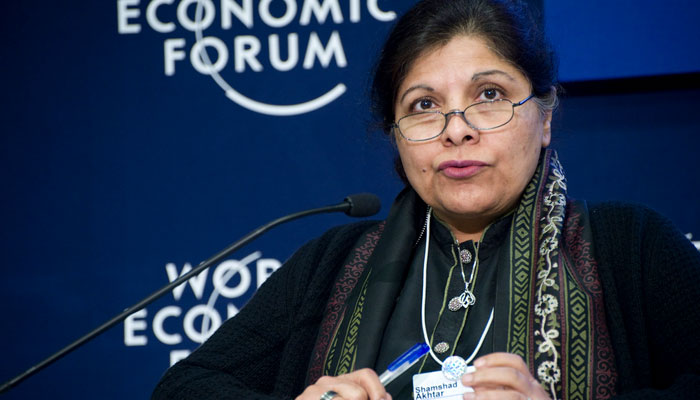‘Public-sector governance in Sindh is deeply rooted in colonial structure,
“Poor public-sector governance, lack of political will, capacity to implement and ability to sustain are some of the reasons of foreign-funded projects not having long-lasting impact in Sindh,” said by Dr Shamshad Akhtar, former governor of the State Bank of Pakistan, during a talk on a book ‘The Economy of Modern Sindh: Opportunities Lost and Lessons for the Future’, co-authored by Dr Ishrat Husain, Prof Aijaz A. Qureshi and Nadeem Hussain.
The talk was organised by the SZABIST department of social sciences. Syed Mohibullah Shah, former principal secretary to former prime minister Benazir Bhutto and head of Board of Investment, said: “The book in discussion is not only a very well-researched academic investigation of Sindh’s economy, but it also a great labour of love.”
He added: “While reading this book, I felt the anguish of the authors about how people and the province of Sindh have been declining and continuously lagging behind when compared to the national averages and with the development indicators of Punjab.”
On a question of what made him and the two co-authors do such a pioneering work on Sindh’s economy, Prof Aijaz A. Qureshi responded, “We felt that the federation of Pakistan would be strengthened and would be stronger when its federating units are economically empowered and financially autonomous.”
He added: “The 18th Amendment to the Constitution was passed by the parliament on April 20, 2010. Significant changes were made to the constitutional framework of Pakistan and as a result of the Amendment, 102 out of a total of 280 articles were amended, substituted, added, inserted, or deleted, which devolved the administrative and financial powers to the provinces, making it imperative for the federating units to realize their true economic potential.”
“We have been systematically made to rely on imports, we imported viceroys in the past and we import everything – from [drama] serials to cell phones – now,” shared Shah.
“We are stuck in the vicious cycle of balancing the books; we borrow loans to repay our debts and to make sure that we remain in the same cycle. Dr Ishrat Husain mentored me and our young co-author, Nadeem Hussain, to gift this piece of academic treasure to Sindh in particular, and Pakistan at large,” Prof Qureshi said in response to a question of dearth of literature and data on regional economies.
Tahira Raza, the former president of First Women Bank Ltd, pointed out that there was a disconnect between political will and administrative capacity. She emphasised the need for financial inclusion of rural women and Pakistan’s pledge for gender parity under the UN Sustainable Development Goals (SDGs) 2030.
Dr Akhtar said: “The women’s participation in the labour force is under-recorded. They [females] are working in the agricultural fields, picking cotton, harvesting wheat, and most importantly doing the unpaid work in their homes.”
“The two major ethnic communities of the province should realise that, given their interdependence and strong linkages between the urban and rural economies of Sindh, a more symbiotic relationship between them would help in maximizing economic potential of the province and thus derive benefits for the constituents of both groups. Their leaders have to forgo narrow parochial considerations and take bold initiatives to work together in removing the political fragmentation, social polarization, and economic distance that have resulted in underperformance. A common bright future is ahead for the province on if they can get their act together,” Shah said, recalling from the book.
The talk was moderated by Nadeem Hussain.
-
 Kelly Clarkson Ready To Date After Talk Show Exit?
Kelly Clarkson Ready To Date After Talk Show Exit? -
 Is AI Heading Into Dangerous Territory? Experts Warn Of Alarming New Trends
Is AI Heading Into Dangerous Territory? Experts Warn Of Alarming New Trends -
 Google Updates Search Tools To Simplify Removal Of Non-consensual Explicit Images
Google Updates Search Tools To Simplify Removal Of Non-consensual Explicit Images -
 Chilling Details Emerge On Jeffrey Epstein’s Parties: Satanic Rights Were Held & People Died In Rough Intimacy
Chilling Details Emerge On Jeffrey Epstein’s Parties: Satanic Rights Were Held & People Died In Rough Intimacy -
 50 Cent Gets Standing Ovation From Eminem In New 'award Video'
50 Cent Gets Standing Ovation From Eminem In New 'award Video' -
 Bad Bunny Delivers Sharp Message To Authorities In Super Bowl Halftime Show
Bad Bunny Delivers Sharp Message To Authorities In Super Bowl Halftime Show -
 Prince William 'worst Nightmare' Becomes Reality
Prince William 'worst Nightmare' Becomes Reality -
 Thai School Shooting: Gunman Opened Fire At School In Southern Thailand Holding Teachers, Students Hostage
Thai School Shooting: Gunman Opened Fire At School In Southern Thailand Holding Teachers, Students Hostage -
 Britain's Chief Prosecutor Breaks Silence After King Charles Vows To Answer All Andrew Questions
Britain's Chief Prosecutor Breaks Silence After King Charles Vows To Answer All Andrew Questions -
 Maxwell Could Get 'shot In The Back Of The Head' If Released: US Congressman
Maxwell Could Get 'shot In The Back Of The Head' If Released: US Congressman -
 New EU Strategy Aims To Curb Threat Of Malicious Drones
New EU Strategy Aims To Curb Threat Of Malicious Drones -
 Halle Berry On How 3 Previous Marriages Shaped Van Hunt Romance
Halle Berry On How 3 Previous Marriages Shaped Van Hunt Romance -
 Facebook Rolls Out AI Animated Profile Pictures And New Creative Tools
Facebook Rolls Out AI Animated Profile Pictures And New Creative Tools -
 NHS Warning To Staff On ‘discouraging First Cousin Marriage’: Is It Medically Justified?
NHS Warning To Staff On ‘discouraging First Cousin Marriage’: Is It Medically Justified? -
 Andrew Mountbatten-Windsor Flew Money In Suitcases To Launder: New Allegation Drops
Andrew Mountbatten-Windsor Flew Money In Suitcases To Launder: New Allegation Drops -
 Nancy Guthrie Abduction: Piers Morgan Reacts To 'massive Breakthrough' In Baffling Case
Nancy Guthrie Abduction: Piers Morgan Reacts To 'massive Breakthrough' In Baffling Case




